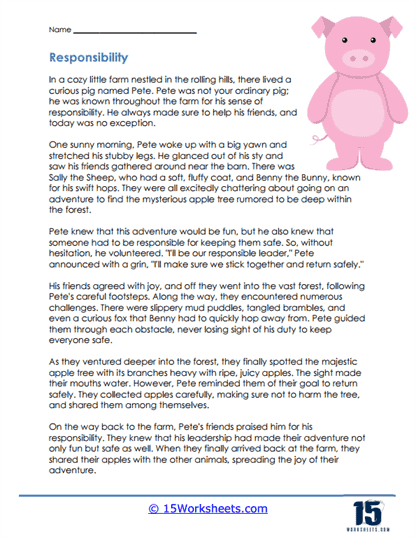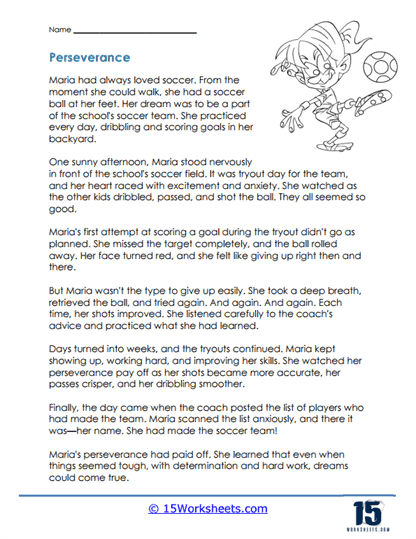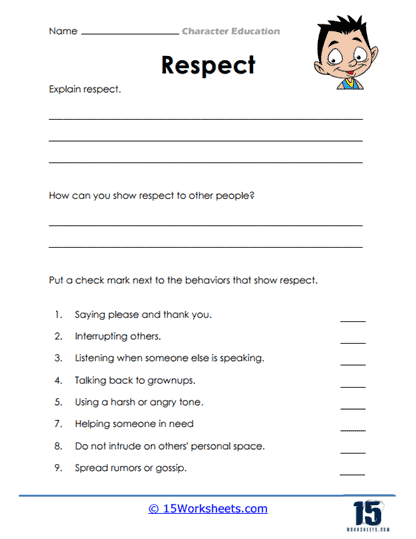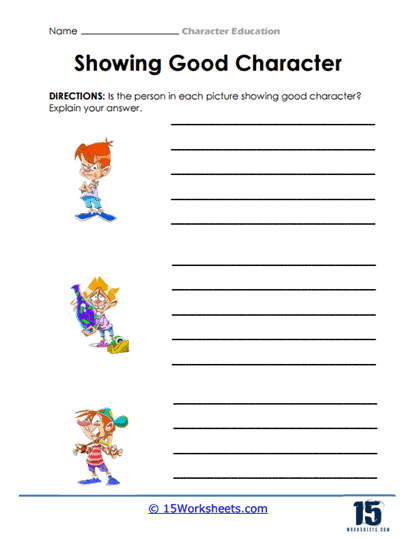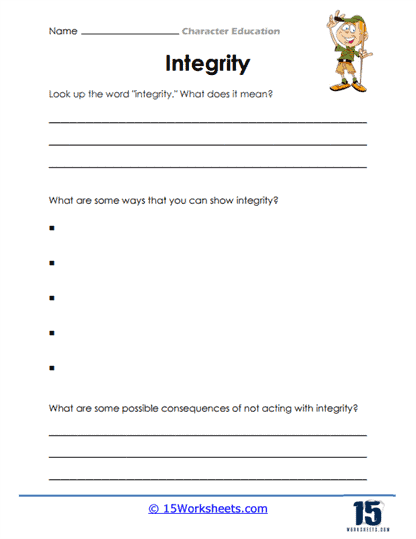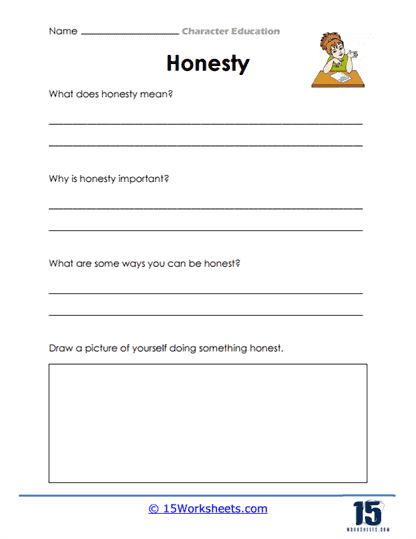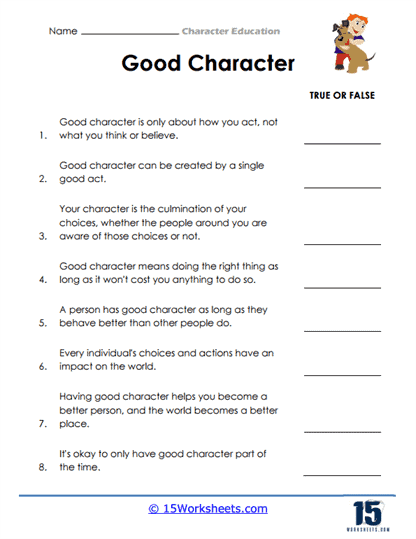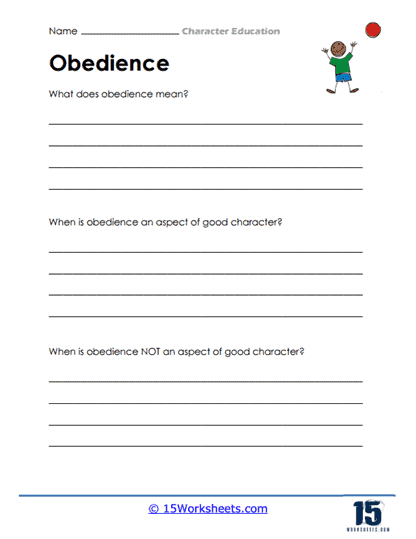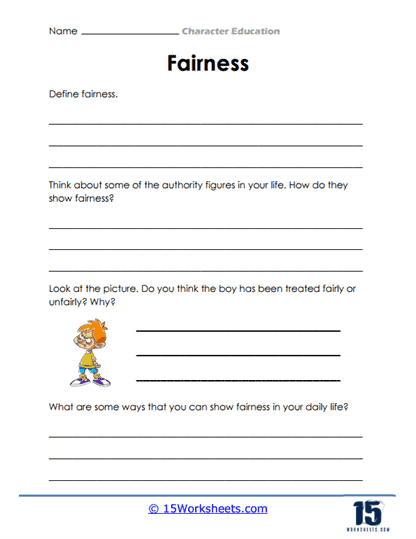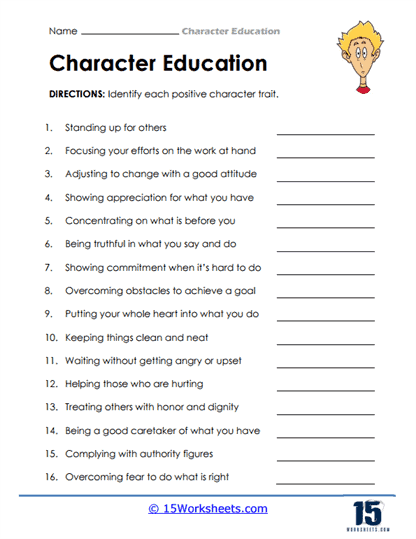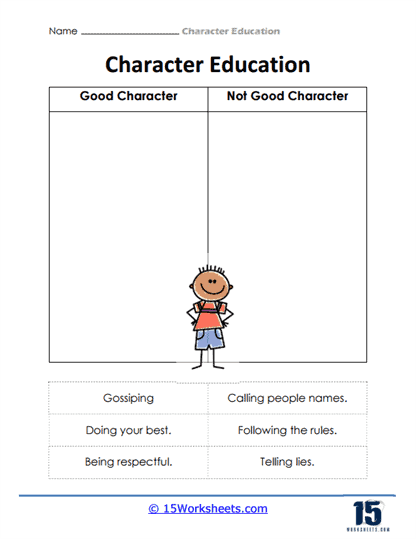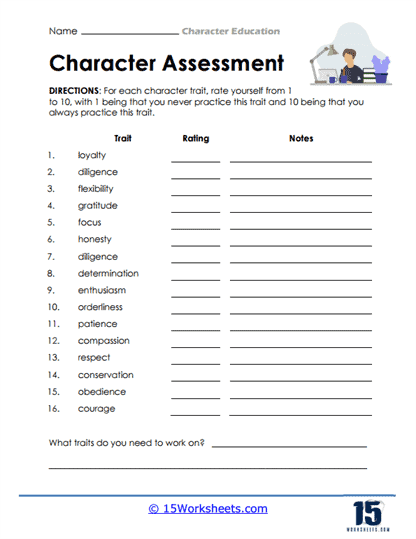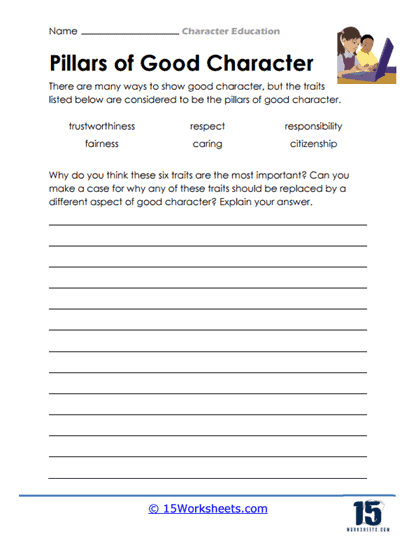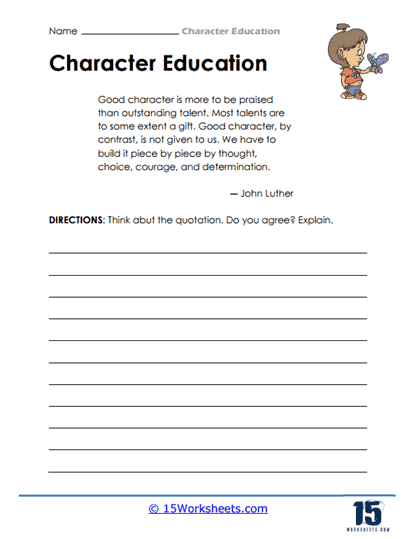Character Education Worksheets
About These 15 Worksheets
These worksheets can play an instrumental role in shaping the moral and ethical compass of students. They act as a mirror, reflecting the values and beliefs of students, and as a guide, directing them towards a path of righteousness, empathy, and respect. In the modern world, where challenges are multifarious and decisions are complex, having a strong character foundation is not just beneficial; it’s imperative. Thus, character education isn’t just about leading a productive life; it’s about leading a meaningful one.
In today’s multifaceted educational environment, the importance of character education cannot be overstated. Just as academic subjects shape the intellect, character education molds the ethical and moral fabric of an individual.
These worksheets will guide students through exercises that prompt reflection, critical thinking, and the development of moral and ethical values. These worksheets aim to reinforce positive behaviors, foster decision-making skills, and cultivate virtues such as respect, honesty, empathy, and responsibility. In essence, they’re designed to nurture not just the mind but the heart.
Types of Exercises
Scenario-Based Questions – These present students with realistic situations where moral or ethical dilemmas are faced. Students must decide what they would do and justify their answers. For example, a question might ask how a student would handle finding a lost wallet. These exercises involve students acting out particular roles to gain perspective on various situations. This method is especially effective for developing empathy as it helps students place themselves in someone else’s shoes.
Value Ranking – Students are presented with a list of values or scenarios and are asked to rank them based on their personal beliefs or societal importance. This involves providing students with stories or descriptions of individuals and asking them to identify the character traits displayed by those individuals. Here, students are presented with a specific value, such as honesty, and are asked to write about a time they exhibited this value or saw it in someone else.
Ethical Discussions – Worksheets may provide a topic or scenario that encourages students to discuss and debate ethical implications, often in group settings. For instance, they might consider the ethical ramifications of cheating on an exam. Students might be asked to set personal goals related to developing specific character traits and then strategize how to achieve them.
Comparative Analysis – These exercises might ask students to compare and contrast the actions of two individuals in a story or scenario, identifying which one displayed better character and why. Visual learners benefit from exercises that prompt them to draw out scenarios, exemplifying character traits or moral decisions visually.
Why is Character Education Essential?
Character education serves as the backbone for many essential life skills and virtues that an individual will carry throughout their life. Its importance can be understood through the following reasons:
Character education lays the foundation for personal virtues such as integrity, perseverance, and empathy. These virtues help individuals lead lives with purpose and meaning. Good character is fundamental for building trust, respect, and mutual understanding in any relationship, whether personal or professional.
A well-rounded character education ensures that individuals are responsible citizens who understand the importance of community service, civic duty, and the value of giving back. In the face of moral dilemmas, individuals equipped with a strong character foundation can make decisions that are ethically and morally sound.
Good character education equips individuals with skills like empathy, understanding, and effective communication, helping in resolving conflicts amicably. Employers value employees with strong character traits such as reliability, honesty, and cooperation. These attributes can set individuals apart in a competitive job market.
Leading a life grounded in good character often leads to personal satisfaction and a sense of fulfillment. Communities where members are imbibed with strong character values tend to be more harmonious, cooperative, and progressive. Individuals with good character serve as role models for younger generations, ensuring that these values are propagated and upheld.
Questions That Inspire Personal Character Development
These questions are designed to encourage introspection and stimulate thought on essential character traits. By contemplating and answering them, students can gain a clearer understanding of their values, beliefs, strengths, and areas for growth.
Self-awareness – When was a time you felt most proud of yourself? Why?
Empathy – Can you recall a time when you truly felt what someone else was going through? How did it change your perspective?
Integrity – Have you ever faced a situation where doing the right thing wasn’t the easiest? How did you handle it?
Responsibility – Can you name a time when you took responsibility for a mistake, even if you could have avoided blame?
Resilience – Describe a situation where you faced failure or disappointment. How did you bounce back?
Open-mindedness – Have you ever changed your mind about something after listening to another person’s viewpoint? What was it?
Courage – Can you remember a time when you stood up for something or someone, even when it was unpopular or risky?
Kindness – How do you show kindness in your daily life, and how do you feel when you witness or receive kindness?
Teamwork – Describe a time when you had to collaborate with others to achieve a common goal. What role did you play, and what did you learn from the experience?
Gratitude – What are three things you’re thankful for today, and why?
Honesty – Why is honesty important in relationships, and can you recall a time when being honest was particularly challenging?
Goal-setting – What are your top three personal goals for this year? How do you plan on achieving them?
Commitment – Can you think of something you’re deeply committed to? What makes you stay committed even when it gets tough?
Humility – Describe a situation where you realized you were wrong or didn’t know as much as you thought. How did you handle it?
Self-control – Can you remember a time when you had to exercise restraint or patience, even when it was challenging?
Generosity – How do you feel when you give without expecting anything in return? Give an example of when you’ve done this.
Reflectiveness – When was the last time you reflected on your actions and decisions? What insights did you gain?
Determination – Describe a challenge you faced where your determination was the driving factor in overcoming it.
Leadership – What qualities do you believe make a great leader, and how do you embody or aspire to embody those qualities?
Respect – How do you show respect to others, even when you might disagree with them? Why is this important?

